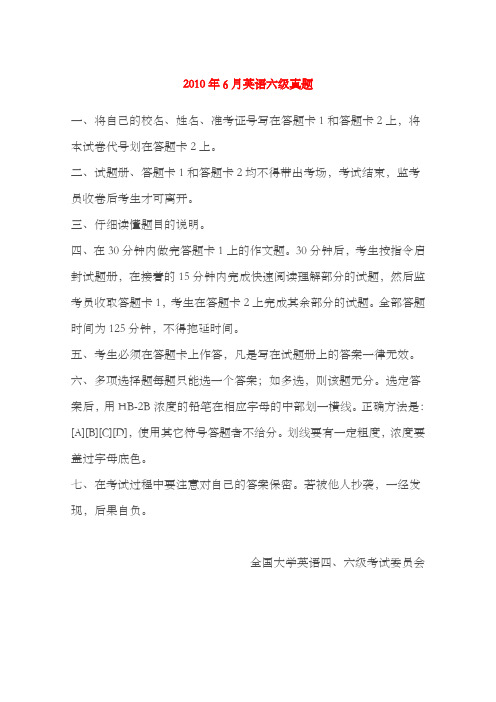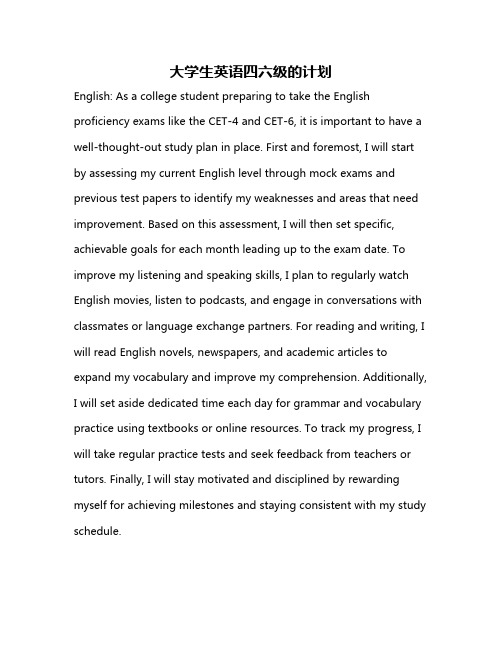2010年6月大学英语六级考试听力冲刺计划
英语六级考试技巧汇总

英语六级考试技巧汇总英语六级考试是中国大学生英语能力的重要标准之一,对于考生来说,熟悉考试技巧非常重要。
在本文中,我将为大家总结一些英语六级考试的技巧,以帮助大家更好地备考和应对考试。
一、听力技巧1. 提前预览题目:在听力测试开始之前,快速浏览一下题目,了解大概内容和所需答案类型,可以更有针对性地听取信息。
2. 关注关键词:在听力过程中,注意听关键词,这些关键词通常用于问问题或提供答案。
3. 注意时态变化:听力材料中的对话或讲话可能涉及到时态的变化,注意抓住这些变化对于理解和回答问题非常重要。
4. 练习听力材料:多听一些六级听力材料,提前适应其中的语速和语调。
二、阅读技巧1. 预览题目和文章:在阅读开始之前,快速浏览一下题目和文章的标题、段落标题等,有助于了解文章的大致结构和内容。
2. 重点词汇标记:标记和注重重点词汇和短语,这些词汇通常在问题中出现或对于理解文章很重要。
3. 抓住关键信息:重点关注作者的观点、态度以及对于某个事件或现象的解释和论证。
4. 善用文章结构:文章通常会采用逻辑结构,如因果关系、比较和对比等,善于理解和应用这些结构对于理解文章和回答问题非常有帮助。
三、写作技巧1. 阅读范文:多读一些优秀的范文,了解不同题型和不同类型文章的写作结构和表达方式。
2. 划分时间:在考试中,合理分配时间是非常重要的,建议先花一些时间阅读题目和文章,再进行写作。
3. 规范的语法和拼写:避免犯一些常见的语法和拼写错误,养成书写时认真检查的习惯。
4. 清晰的结构和观点:写作时需要有明确的结构,包括引言、正文和结论,结构清晰可以让读者更好地理解你的观点。
四、翻译技巧1. 练习翻译:多做一些翻译练习,提高自己的翻译能力和词汇储备量。
2. 确定句子边界:在翻译句子时,首先确定句子的边界,理解句子整体的意思。
3. 不死词逐个翻译:对于一些不死词,如冠词、介词等,逐个翻译并加入到整个句子的翻译中。
4. 灵活运用翻译策略:翻译时可以根据需要灵活运用各种翻译策略,如逐词翻译、意译等。
英语六级三个月复习计划

英语六级三个月复习计划冲破英语四级这个关口后,很多同学也要向六级进发了。
英语六级该如何有计划地复习?英语六级三个月复习计划一六级复习分阶段进行,基础阶段、强化阶段和最后的冲刺阶段。
一.基础阶段(X月--X月中旬)X月-X月中旬基础阶段主要是要在单词和听力上下功夫。
原因是单词是六级考试的基础,各个题型都少不了丰富的词汇量,而听力的提高是日积月累的过程,所以从基础阶段就要抓起。
1. 六级单词:如果你厌倦了捧着单词书A-Z的背诵模式,建议尝试长喜英语官网上的黑白词过关,选择好六级核心词汇(1307词,65关)、六级考试高频词汇(876词,44关)、六级扩展词汇(1039词,50关),按照自己的节奏,制定每天的通关计划,反复记忆,熟记单词的同时学会运用。
2. 听力复习:听力第一阶段:听力材料:BBC和VOA 。
利用BBC 和 VOA素材进行反复听写练习,熟悉各类语音、语调、语速,基础较为薄弱的同学可以从慢速VOA开始。
3. 阅读材料:浏览卫报、时代周刊等网站,了解社会、经济、科技方面的内容,因为历年六级考试阅读部分常从这些外刊上选材。
二.强化阶段 (X月中旬-X月中旬)强化阶段阅读、听力、单词、写作都要抓。
1. 听力:听力第二阶段:继续进行BBC、VOA听力练习的同时可以听一些《走遍美国》( Family Album )、《空中美语教室》 (Classroom Studio)、流行美语、地道英语之类的听力节目,因为这些材料中对话部分是对生活情景的最佳分类,是积累听力考试对话场景词汇的最佳素材,而一些短小文章性的素材则有助于篇章对话与听写的提高。
2. 单词:词场的3000六级词汇(也许不到3XXX个词,因为核心、高频、扩展词汇中有一些是重复的单词)反复背诵,并在作文练笔中经常使用,真正做到学以致用。
3. 阅读:在广泛接触各类阅读材料的同时掌握阅读方法。
大家都知道阅读题主要有五种题型,分别为:细节题、主旨题、推断题、态度题和语义题。
六级一个月复习计划

六级一个月复习计划
复习六级只有一个月的时间是相当紧张的,但是如果你有足够的决心和恒心,下面是一个可能的复习计划供参考:
第一周:
1. 了解考试内容和题型:仔细研究六级考试的内容和题型,了解每个部分的要求和注意事项。
2. 做一次全真模拟考试:通过一次全真模拟考试,评估自己的水平,并了解自己哪些方面需要特别关注。
3. 重点选择阅读和听力:确定自己在阅读和听力方面的薄弱点,并确定需要重点复习的内容。
第二周:
1. 阅读练习:刷题或者找一些六级阅读材料进行练习,注意对于不熟悉的单词和句子结构进行针对性的复习。
2. 听力练习:找一些六级听力材料进行练习,注意听取和理解关键信息和细节。
3. 写作练习:选择几个六级写作题目进行练习,特别注重写作结构和语法的准确性。
第三周:
1. 语法和词汇复习:复习六级考试常考的语法知识点和重点词汇,可以通过查阅一本
六级语法和词汇书籍来进行复习。
2. 完整模拟一次考试:再次进行一次全真模拟考试,检验自己在各个方面的进步和不足。
第四周:
1. 强化练习:针对前三周的复习中发现的问题进行有针对性的强化练习。
2. 查漏补缺:重新温习之前的复习内容,查漏补缺,强化记忆。
3. 放松调整:在考试前的几天,适当放松身心,保持良好的精神状态。
请注意,以上复习计划仅供参考,具体的复习内容和安排应根据自己的个人情况和需
求进行调整。
最重要的是要提前做好计划,并坚持执行计划,保持积极的态度和自信。
祝你取得好成绩!。
大学英语六级培训计划方案

一、培训目标本培训计划旨在帮助学员全面提高英语六级水平,包括听力、口语、阅读、写作和翻译五个方面,使其能够顺利通过大学英语六级考试,达到《大学英语课程教学要求》中六级的要求。
二、培训内容1. 听力训练:包括听力技巧、听力材料、听力练习等,重点培养学员的听力理解能力。
2. 口语训练:包括口语技巧、口语材料、口语练习等,提升学员的英语口语表达能力。
3. 阅读训练:包括阅读技巧、阅读材料、阅读练习等,提高学员的快速阅读和深度阅读能力。
4. 写作训练:包括写作技巧、写作材料、写作练习等,培养学员的英语写作能力和逻辑思维能力。
5. 翻译训练:包括翻译技巧、翻译材料、翻译练习等,增强学员的英汉互译能力。
6. 模拟考试:通过模拟考试,让学员熟悉考试流程,检验学习成果,提升应试技巧。
三、培训计划第一阶段(1-2周):听力与口语训练1. 听力训练:- 掌握听力技巧,如预测、推测、判断等;- 听力材料以真题为主,包括听力短文、长对话、短对话等;- 每天听力练习1-2小时,每周进行一次模拟考试。
2. 口语训练:- 掌握口语技巧,如流利度、语音语调、语法等;- 口语材料以真题为主,包括口语短文、长对话、短对话等;- 每天口语练习1-2小时,每周进行一次模拟考试。
第二阶段(3-4周):阅读与写作训练1. 阅读训练:- 掌握阅读技巧,如快速阅读、深度阅读等;- 阅读材料以真题为主,包括阅读理解、长篇阅读、仔细阅读等;- 每天阅读练习1-2小时,每周进行一次模拟考试。
2. 写作训练:- 掌握写作技巧,如文章结构、句型变换、词汇运用等;- 写作材料以真题为主,包括作文、翻译等;- 每天写作练习1-2小时,每周进行一次模拟考试。
第三阶段(5-6周):翻译与模拟考试1. 翻译训练:- 掌握翻译技巧,如词汇翻译、句型翻译等;- 翻译材料以真题为主,包括英汉互译等;- 每天翻译练习1-2小时,每周进行一次模拟考试。
2. 模拟考试:- 每周进行一次全真模拟考试,让学员熟悉考试流程,检验学习成果;- 分析考试结果,总结经验教训,调整学习策略。
大学英语四、六级提升方案

大学英语四、六级提升方案目标提高大学生的英语水平,帮助他们通过英语四、六级考试。
方案1. 制定研究计划- 设定明确的研究目标,如每天研究一小时。
- 制定周计划和每日计划,安排合理的研究时间和内容。
- 确定研究方法和资源,如使用教材、参加课程或找到研究伙伴。
2. 提高听力技能- 每天听英语新闻、音乐或录音,并尝试听懂其中的关键信息。
- 使用在线工具和应用程序,如听力练软件或听力材料。
- 参加英语角或语言交流活动,提高听力和口语能力。
3. 发展阅读能力- 阅读大量英语文章、小说或杂志,增加词汇量和阅读理解能力。
- 使用词典和词汇研究工具,查找新词汇并进行积累。
- 练快速阅读技巧,如扫视和标记关键信息。
4. 加强口语表达- 每天练口语,如跟读、模仿和自由对话。
- 参加口语角或英语口语俱乐部,与他人实践口语交流。
- 寻找语音训练材料,如练口语语调和发音。
5. 提升写作能力- 练写作,如写日记、文章或短文。
- 查看写作范例和模板,研究良好的写作结构和表达方式。
- 寻求他人的反馈和建议,不断改进自己的写作技巧。
6. 复和模拟考试- 适时进行复,将已学知识进行巩固和回顾。
- 参加模拟考试,评估自己的英语水平,并找出薄弱之处。
- 针对性地进行复和强化训练,提高四、六级考试的应试能力。
总结通过以上提到的学习方案,大学生可以有针对性地提升自己的英语水平,并顺利通过英语四、六级考试。
坚持规划好的学习计划,持续努力和不断反思,相信他们一定能够取得好成绩。
2010年6月英语六级真题+听力原文+答案详解

2010年6月英语六级真题一、将自己的校名、姓名、准考证号写在答题卡1和答题卡2上,将本试卷代号划在答题卡2上。
二、试题册、答题卡1和答题卡2均不得带出考场,考试结束,监考员收卷后考生才可离开。
三、仔细读懂题目的说明。
四、在30分钟内做完答题卡1上的作文题。
30分钟后,考生按指令启封试题册,在接着的15分钟内完成快速阅读理解部分的试题,然后监考员收取答题卡1,考生在答题卡2上完成其余部分的试题。
全部答题时间为125分钟,不得拖延时间。
五、考生必须在答题卡上作答,凡是写在试题册上的答案一律无效。
六、多项选择题每题只能选一个答案;如多选,则该题无分。
选定答案后,用HB-2B浓度的铅笔在相应字母的中部划一横线。
正确方法是:[A][B][C][D],使用其它符号答题者不给分。
划线要有一定粗度,浓度要盖过字母底色。
七、在考试过程中要注意对自己的答案保密。
若被他人抄袭,一经发现,后果自负。
全国大学英语四、六级考试委员会Part I Writing (30 minutes)注意:此部分试题在答题卡1上。
Directions: For this part, you are allowed 30 minutes to write a short essay on the topic of Due Attention Should Be Given to the Study of Chinese. You should write at least 120 words following the outline given below:1.近年来在学生中出现了忽视中文学习的现象;2.出现这种现象的原因和后果;3.我认为…Due Attention Should Be Given to the Study of Chinese__________________________________________________________ ____________________________________________________________ ____________________________________________________________ ____________________________________________________________ ____________________________________________________________ ____________________________________________________________ ____________________________________________________________ ____________________________________________________________ ____________________________________________________________ ____________________________________________________________ ____________________________________________________________ ________________________________________________________________________________________________________________________ ____________________________________________________________ ____________________________________________________________ ____________________________________________________________ ____________________________________________________________ ________Part II Reading Comprehension (Skimming and Scanning) (15 minutes)Directions: In this part, you will have 15 minutes to go over the passage quickly and answer the questions on Answer Sheet 1. For questions 1-7, choose the best answer from the four choices marked A), B), C) and D). For questions 8-10, complete the sentences with the information given in thepassage.Obama's success isn't all good news for black AmericansAs Erin White watched the election results head towards victory for Barack Obama, she felt a burden lifting from her shoulders. "In that one second, it was a validation for my whole race," she recalls."I've always been an achiever," says White, who is studying for an MBA at Vanderbilt University in Nashville, Tennessee. "But there had always been these things in the back of my mind questioning whether I really can be who Iwant. It was like a shadow, following me around saying you can only go so far. Now it's like a barrier has been let down."White's experience is what many psychologists had expected - that Obama would prove to be a powerful role model for African Americans. Some hoped his rise to prominence would have a big impact on white Americans, too, challenging those who still harbour racist sentiments. "The traits that characterise him are very contradictory to the racial stereotypes that black people are aggressive and uneducated," says Ashby Plant of Florida State University. "He's very intelligent and eloquent."Sting in the tailAshby Plant is one of a number of psychologists who seized on Obama's candidacy to test hypotheses about the power of role models. Their work is already starting to reveal how the "Obama effect" is changing people's views and behaviour. Perhaps surprisingly, it is not all good news: there is a sting in the tail of the Obama effect.But first the good news. Barack Obama really is a positive role model for African Americans, and he was making an impact even before he got to the White House. Indeed, the Obama effect can be surprisingly immediate and powerful, as Ray Friedman of Vanderbilt University and his colleagues discovered.They tested four separate groups at four key stages of Obama's presidential campaign. Each group consisted of around 120 adults of similar age andeducation, and the test assessed their language skills. At two of these stages, when Obama's success was less than certain, the tests showed a clear difference between the scores of the white and black participants—an average of 12.1 out of 20, compared to 8.8, for example. When the Obama fever was at its height, however, the black participants performed much better. Those who had watched Obama's acceptance speech as the Democrats' presidential candidate performed just as well, on average, as the white subjects.After his election victory, this was true of all the black participants.Dramatic shiftWhat can explain this dramatic shift? At the start of the test, the participants had to declare their race and were told their results would be used to assess their strengths and weaknesses. This should have primed the subjects with "stereotype threat" – an anxiety that their results will confirm negative stereotypes, which has been shown to damage the performance of African Americans.Obama's successes seemed to act as a shield against this. "We suspect they felt inspired and energised by his victory, so the stereotype threat wouldn't prove a distraction," says Friedman.Lingering racismIf the Obama effect is positive for African Americans, how is it affecting their white compatriots (同胞)? Is the experience of having a charismatic (有魅力的) black president modifying lingering racist attitudes? There is no easyway to measure racism directly; instead psychologists assess what is known as "implicit bias", using a computer-based test that measures how quickly people associate positive and negative words—such as "love" or "evil"—with photos of black or white faces. A similar test can also measure how quickly subjects associate stereotypical traits—such as athletic skills or mental ability—with a particular group.In a study that will appear in the Journal of Experimental Social Psychology, Plant's team tested 229 students during the height of the Obama fever. They found that implicit bias has fallen by as much as 90% compared with the level found in a similar study in 2006. "That's an unusually large drop," Plant says.While the team can't be sure their results are due solely to Obama, they also showed that those with the lowest bias were likely to subconsciously associate black skin colour with political words such as "government" or "president". This suggests that Obama was strongly on their mind, says Plant. Drop in biasBrian Nosek of the University of Virginia in Charlottesville, who runs a website that measures implicit bias using similar test, has also observed a small drop in bias in the 700,000 visitors to the site since January 2007, which might be explained by Obama's rise to popularity. However, his preliminary results suggest that change will be much slower coming than Plant's results suggest. Talking honestly"People now have the opportunity of expressing support for Obama every day," says Daniel Effron at Stanford University in California. "Our research arouses the concern that people may now be more likely to raise negative views of African Americans." On the other hand, he says, it may just encourage people to talk more honestly about their feelings regarding race issues, which may not be such a bad thing.Another part of the study suggests far more is at stake than the mere expression of views. The Obama effect may have a negative side. Just one week after Obama was elected president, participants were less ready to support policies designed to address racial inequality than they had been two weeks before the election. Huge obstaclesIt could, of course, also be that Obama's success helps people to forget that a disproportionate number of black Americans still live in poverty and face huge obstacles when trying to overcome these circumstances. "Barack Obama's family is such a salient (出色的) image, we generalise it and fail to see the larger picture—that there's injustice in every aspect of American life," says Cheryl Kaiser of the University of Washington in Seattle. Those trying to address issues of racial inequality need to constantly remind people of the inequalities that still exist to counteract the Obama's effect, she says.Though Plant's findings were more positive, she too warns against thinking that racism and racial inequalities are no longer a problem. "The last thing I want is for people to think everything's solved."These findings do not only apply to Obama, or even just to race. They should hold for any role model in any country. "There's no reason we wouldn't have seen the same effect on our views of women if Hillary Clinton or Sarah Palin had been elected," says Effron. So the election of a female leader might have a downside for other women.Beyond raceWe also don't yet know how long the Obama effect—both its good side and its bad—will last.Political sentiment is notoriously changeable: What if things begin to go wrong for Obama, and his popularity slumps?And what if Americans become so familiar with having Obama as their president that they stop considering his race altogether? "Over time he might become his own entity," says Plant. This might seem like the ultimate defeat for racism, but ignoring the race of certain select individuals—a phenomenon that psychologists call subtyping—also has an insidious (隐伏的) side. "We think it happens to help people preserve their beliefs, so they can still hold on to the previous stereotypes." That could turn out to be the cruellest of all the twists to the Obama effect.注意:此部分试题请在答题卡1上作答。
大学生英语四六级的计划

大学生英语四六级的计划English: As a college student preparing to take the English proficiency exams like the CET-4 and CET-6, it is important to have a well-thought-out study plan in place. First and foremost, I will start by assessing my current English level through mock exams and previous test papers to identify my weaknesses and areas that need improvement. Based on this assessment, I will then set specific, achievable goals for each month leading up to the exam date. To improve my listening and speaking skills, I plan to regularly watch English movies, listen to podcasts, and engage in conversations with classmates or language exchange partners. For reading and writing, I will read English novels, newspapers, and academic articles to expand my vocabulary and improve my comprehension. Additionally, I will set aside dedicated time each day for grammar and vocabulary practice using textbooks or online resources. To track my progress, I will take regular practice tests and seek feedback from teachers or tutors. Finally, I will stay motivated and disciplined by rewarding myself for achieving milestones and staying consistent with my study schedule.Translated content: 作为一名准备参加英语四六级等英语水平考试的大学生,制定一份周密的学习计划至关重要。
大学英语四六级高分复习计划【拿到四级626分,六级610分】

本文由xiaohuozi1990贡献 doc文档可能在WAP端浏览体验不佳。
建议您优先选择TXT,或下载源文件到本机查看。
四六级高分是这样练成滴, 天高分复习计划( 四六级高分是这样练成滴,四六级 87 天高分复习计划(笔者用这个复习计划拿到四级 626 分,六级 610 分)(短短 5 天,原文点击量已过 10 万,我来转来让更多的人看到, 我来转来让更多的人看到, 短短 感谢原作者!!! !!!) 感谢原作者!!! 2010-01-16 22:53 | (分类:收藏) 些下不了的同学别急!!楼主已经把复 些下不了的同学别急!!楼主已经把复 !! 习资料内容做成日志了, 习资料内容做成日志了,大家可进我主 页找!! 页找!! 那 给所有正在为四六级考试挣扎 犹豫,痛苦的兄弟姐妹们。
挣扎, 献给所有正在为四六级考试挣扎,犹豫,痛苦的兄弟姐妹们。
趁还没有改革成机考的最后几次机会,赶紧把四六级过了吧。
趁还没有改革成机考的最后几次机会,赶紧把四六级过了吧。
1.练好口语,顺便考试拿高分……这是李阳老师的名言。
2.笔者认为,书店里有这么多词汇书的原因绝不是因为词汇书对英语学习有多大帮助, 而是因为有人买,有很多人买,说白了,是因为有市场。
那些商家才不管你能不能过四 六级,他们只关心他们的书有多少人买。
在中国,大部分英语学习者把背单词等同于学英 在中国,大部分英语学习者把背单词等同于学英 在中国 语,这种误区直接造成了一种超级尴尬的局面:中国学生的口语在全球排在倒数的位 这种误区直接造成了一种超级尴尬的局面: 置,中国学生的雅思成绩排在全球倒数第二。
背单词不如背句子,背句子不如背句型,背 中国学生的雅思成绩排在全球倒数第二。
文章。
3.有没有想过朗读和背诵四级听力原文?有没有想过如果你能把听力对话脱口而出?有 没有想过,如果你能脱口而出了,那么自然也就听懂了。
如果你能脱口而出了,那么自然也就听懂了。
- 1、下载文档前请自行甄别文档内容的完整性,平台不提供额外的编辑、内容补充、找答案等附加服务。
- 2、"仅部分预览"的文档,不可在线预览部分如存在完整性等问题,可反馈申请退款(可完整预览的文档不适用该条件!)。
- 3、如文档侵犯您的权益,请联系客服反馈,我们会尽快为您处理(人工客服工作时间:9:00-18:30)。
2010年6月大学英语六级考试听力冲刺计划2010年04月28日09:21新东方贾佶字号:T|T
第一阶段:基础
5月3日-12日:10天——听力词汇,基础最后冲刺。
将2000年1月到2008年6月所有真题中的单词突击一遍,其中包括题目,选项,听力原文中的单词,做到听到能识别,并且能够正确拼写,结合上下文语境记忆单词含义。
难词,偏词做笔记突破。
坚持每天3个长难句听写。
5月13日-16日:4天——发音技巧熟悉识别
找到听得比较舒服的一套做过的题,把做题之后对答案这个做题习惯放在次要的位置上,反复听听力,并在听力原文上标注出上课的时候我讲解过的发音技巧,和英美音的差异现象。
(不完全爆破,连读,实意重读,语调,浊化,弱化。
)这个阶段也可以在真题之外结合美剧,电影或英文歌曲提高听力节奏感,这些发音语感技巧体显得最淋漓尽致的材料可以协助六级听力真题双管齐下,帮助大家在考试前尽快适应充满纯正英语(论坛)说话习惯(发音技巧)的真实英语的语流。
第二阶段:对话
5月17日-23日:7天——对话练习
新六级的听力部分包含短对话八题和长对话七题。
其中,短对话共8段,长对话共两段。
短对话部分要尤其注意对话地点类、人物职业关系类、建议类、动作类以及含义解释推论题。
大家在这个阶段做题的同时要翻开强化班讲义,回顾出题情结规律,熟悉解题关键词。
长对话部分除了采用短对话的问法之外,更倾向于考察主旨方向,要学会边听,边排除错误选项。
找到两个人交谈一问一答的回合感,问题出现之前一般就可以把答案选出来了。
注意积累和总结以下主题的短语和词汇:旅行,大学,机场,设计,银行,工作场景。
第三阶段:短篇
5月24日——6月6日:14天——段子题练习
新六级听力段子题是大家比较头疼的一种题型。
在这两周时间里面,大家要把最近6次考试的段子题集中做一遍。
每周3套:周一三五,做题,对准确率。
周二四六,查错,分析原因,查缺补漏。
周日:对题目中错的最多的听力段落进行听抄(听抄方法参考讲义和课堂讲解)
这两周集中练习可以帮助大家习惯六级短篇听力的语速,难度和信息编排规律,保证在考试的时候听到题目头脑不会断电,胸不会闷,手不会抖。
听抄部分其实也是在为最后的复合式听写题目做准备。
6月7日-13日:7天——复合式听写题
其实听写练习在5月初的基础部分的长难句听抄中和第三阶段前两周的周日听抄练习中在扎实的练习了。
这七天要把新六级考试以来所有考试07年6月,08年6月,08年12月,09年6月,和09年12月的五个复合式听写做一遍,记录不会的单词,分析后面的长句(长难句分析法见讲义)。
第四阶段:考前最后五天
主要任务是巩固成果,保持状态。
把以前已经听得烂熟的听力题目拿出来再一次重听。
考试之前2天,每天按标准时间做一套听力的完整题目,没有新题了,就把以前的题目拿出来重新做一遍也可以。
进入到考试的节奏,放松心情,自信答题。
